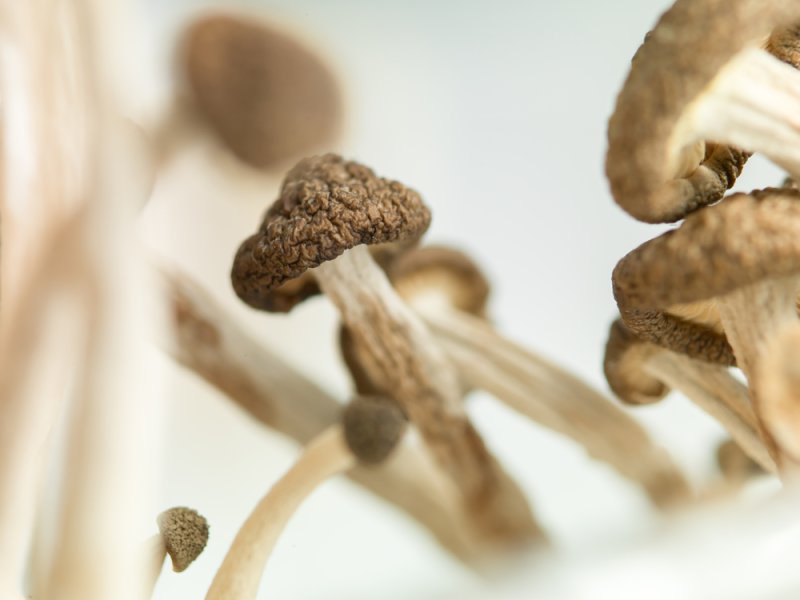
Psilocybin, the ingredient that gives psychedelic mushrooms their mind-altering effects, appears to have therapeutic benefits for people with depression, according to a new study.
File photo by Shots Studio/Shutterstock.
April 11 (UPI) -- Psilocybin, the ingredient that gives so-called psychedelic mushrooms their mind-altering effects, helps reduce the symptoms of depression, a study published Monday by Nature Medicine found.
Based on brain scans of roughly 60 people receiving the compound as a treatment for depression, it appears to foster improved communication between different regions of the brain, even after its hallucinogenic effects have worn off, the researchers said.
This may be how psilocybin works as a treatment for depression and other mental health disorders, they said.
"These findings are important because for the first time, we find that psilocybin works differently from conventional antidepressants," study co-author David Nutt said in a press release.
April 11 (UPI) -- Psilocybin, the ingredient that gives so-called psychedelic mushrooms their mind-altering effects, helps reduce the symptoms of depression, a study published Monday by Nature Medicine found.
Based on brain scans of roughly 60 people receiving the compound as a treatment for depression, it appears to foster improved communication between different regions of the brain, even after its hallucinogenic effects have worn off, the researchers said.
This may be how psilocybin works as a treatment for depression and other mental health disorders, they said.
"These findings are important because for the first time, we find that psilocybin works differently from conventional antidepressants," study co-author David Nutt said in a press release.
RELATED Magic mushroom' therapy may interact with other medicines
It appears to work by "making the brain more flexible and fluid, and less entrenched in the negative thinking patterns associated with depression," said Nutt, head of the Imperial Center for Psychedelic Research at Imperial College in London.
Psilocybin is one of a number of psychedelics being explored as a potential therapy for mental health disorders.
Several studies have examined the use of a synthesized form of the drug to treat patients with depression and anxiety, with promising results.
RELATED 'Magic mushroom' drug psilocybin edges toward mainstream therapy
These findings, taken from two combined studies, reveal that people who responded to psilocybin had evidence of increased brain connectivity both during their treatment and up to three weeks later, the researchers said.
This enhanced connectivity was associated with self-reported improvements in their depression, according to the researchers.
Patterns of brain activity in depression can become rigid and restricted, leading to repetitive negative thinking, they said.
RELATED Study finds 'magic mushroom' hallucinogen as good as antidepressants
Similar changes in brain connectivity were not seen in those treated with a commonly used prescription antidepressant, which indicates the psychedelic may work differently in treating the condition, the researchers said.
For the two studies, the researchers analyzed functional magnetic resonance imaging, or fMRI, scans of the brains of nearly 60 participants, about half of whom received psilocybin, while the remainder were treated with the anti-depressant escitalopram.
All participants also attended talking therapy sessions with registered mental health professionals. Brain scans were taken before and then one day or three weeks after participants received drug therapy, the researchers said.
Both studies found that depression patients treated with psilocybin experienced improvement in their symptoms, based on responses to clinical questionnaires, the data showed.
Analysis of the brain scans revealed altered communication or connectivity between brain regions, particularly those that are thought to be more segregated in depressed patients, according to the researchers.
There was a correlation between this effect and symptom improvement in both studies, although the strength and duration of effect varied between participants, the researchers said.
However, the effect was strongest in participants who reported an improvement in their symptoms, they said.
Still, the researchers caution that though these findings are encouraging, they are based on studies conducted under controlled, clinical conditions, using a regulated dose of psilocybin formulated in a laboratory, with extensive psychological support from mental health professionals.
People with depression should not attempt to self-medicate with psilocybin, as taking magic mushrooms or psilocybin in the absence of these careful safeguards may not have a positive outcome, the researchers said.
"We don't yet know how long the changes in brain activity seen with psilocybin therapy last and we need to do more research to understand this," study co-author Robin Carhart-Harris said in a press release.
"We do know that some people relapse, and it may be that after a while their brains revert to the rigid patterns of activity we see in depression," said Carhart-Harris, a psychologist and neuroscientist at the University of California-San Francisco.
No comments:
Post a Comment